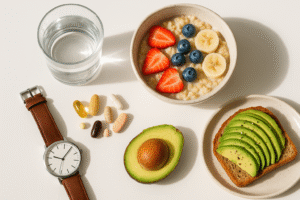Table of Contents
ToggleWhy Do We Need Vitamins?
Vitamins are small molecules, but they are essential for the proper functioning of the body.
They play crucial roles in hundreds of biological processes — from energy production and cell growth to immune support and hormone regulation.
However, since the human body cannot produce most vitamins in sufficient quantities, we must obtain them from food.
In today’s fast-paced world, many people rely on fast food and processed meals, which often lack fresh, nutrient-dense ingredients.
Over time, this leads to subtle but harmful deficiencies — such as chronic fatigue, hair loss, poor focus, or weak immunity.
According to the World Health Organization (WHO), more than 2 billion people worldwide suffer from some form of micronutrient deficiency, including iron, vitamin A, iodine, and zinc.
That raises an important question:
Can we get enough vitamins from natural food alone, or do we need supplements?
What Are Natural Vitamins?
Natural vitamins are those obtained from whole foods — fresh fruits, vegetables, whole grains, legumes, meats, fish, and nuts.
These vitamins come in a complete nutritional matrix that includes fiber, minerals, antioxidants, and enzymes — all of which help the body absorb and use nutrients more effectively.
For example, when you eat an orange, you don’t just get vitamin C — you also consume plant compounds called flavonoids, which boost absorption and protect your cells from inflammation.
This natural synergy makes whole-food vitamins safer, more efficient, and more beneficial than isolated synthetic versions.
Sources of Vitamins from Food:
The natural world is rich in vitamins, and every food group contributes in different ways:
-
Vitamin A – found in liver, carrots, sweet potatoes, and spinach.
-
Vitamin C – abundant in citrus fruits, strawberries, kiwi, and red peppers.
-
Vitamin D – produced in the skin through sunlight exposure and found in fatty fish and egg yolks.
-
B Vitamins – present in whole grains, legumes, eggs, and meats.
-
Vitamin E – found in nuts, seeds, vegetable oils, and avocados.
-
Vitamin K – available in leafy greens like spinach and broccoli.
These foods don’t just supply vitamins — they also contain vital compounds that support heart, bone, and brain health.
Benefits of Getting Vitamins from Food:
Obtaining vitamins from food provides many advantages that supplements can’t replicate.
First, absorption is more efficient. Whole foods contain enzymes and healthy fats that enhance nutrient uptake.
Second, they offer synergistic effects — natural antioxidants and plant compounds work together to protect cells and reduce inflammation.
Third, they are naturally safe — it’s almost impossible to overdose on vitamins through food alone.
Fourth, whole foods promote fullness and stable energy, helping regulate metabolism and mood.
In short, nature provides vitamins in their most complete, balanced, and bioavailable form.
What Are Vitamin Supplements?
Vitamin supplements are manufactured products designed to fill nutritional gaps or address specific health needs.
They come in various forms — tablets, capsules, powders, or liquids — and may contain a single vitamin or a mix of several.
People take supplements for different reasons:
to correct deficiencies, boost immunity, improve energy, or enhance athletic performance.
However, supplements are not substitutes for real food. They should only be used to complement a healthy diet when medically necessary.
According to the U.S. Office of Dietary Supplements (ODS), there is no strong evidence that multivitamin use reduces the risk of chronic diseases like heart disease or cancer — but they can help individuals with confirmed nutritional deficiencies.
Key Differences Between Natural Vitamins and Supplements
The differences go beyond the source — they involve how the body absorbs and utilizes nutrients.
Natural vitamins are more easily absorbed because the body recognizes them as part of real food.
Synthetic supplements, however, may have slightly altered chemical structures that affect absorption.
Whole foods also offer a variety of nutrients and phytonutrients that supplements lack.
Supplements provide precise, concentrated doses, but they often miss the natural balance found in food.
In terms of cost and convenience, supplements are cheaper and easier to use — but they can never replace the holistic benefits of a diverse diet.
When Are Natural Vitamins Enough?
Natural vitamins are usually sufficient if you follow a balanced and varied diet.
Healthy individuals who eat fresh fruits, vegetables, proteins, and whole grains regularly — and who have no digestive disorders — generally do not need extra supplements.
Those who get regular sunlight exposure and eat nutrient-rich foods can easily meet their daily vitamin requirements without additional help.
When Do We Need Supplements?
There are specific cases where supplements become necessary or beneficial:
-
Pregnancy and breastfeeding: Increased demand for folic acid, iron, and other nutrients.
-
Older adults: Decreased absorption of B12 and D vitamins with age.
-
Vegetarians and vegans: Often need B12 and iron supplementation due to lack of animal-based sources.
-
Athletes: May require additional nutrients to support recovery and energy metabolism.
-
People with digestive disorders or surgeries: Conditions like Crohn’s disease or gastric bypass affect absorption.
-
Winter months or limited sunlight exposure: Supplementing vitamin D is often recommended.
In these cases, supplements play a therapeutic or preventive role under medical guidance.
Are Supplements Always Safe? Risks and Warnings.
While supplements can be helpful, they are not risk-free — especially when taken without professional advice.
-
Overdose Risk: Fat-soluble vitamins (A, D, E, K) can accumulate in the liver and cause toxicity when taken in high doses.
-
Drug Interactions: Some supplements interfere with medications, like blood thinners or heart drugs.
-
Product Quality: Not all supplements are regulated strictly, and quality may vary between brands.
-
Dependency Risk: Using supplements instead of maintaining a healthy diet can lead to imbalanced nutrition.
According to Mayo Clinic, around 60% of supplement users take them without consulting a doctor, increasing the risk of overdose and adverse interactions.
Conclusion: Balance Between Food and Supplements for Better Health.
The smartest approach isn’t choosing between food and supplements — it’s finding a healthy balance between the two.
Whole foods should always be your primary source of nutrients, while supplements serve as a supportive backup when needed.
Good nutrition starts at your table, not in a bottle.
Eat a colorful, varied diet, stay hydrated, get moderate sunlight, and move your body regularly — these habits strengthen your immunity and longevity far more than any pill ever could.
Remember: supplements can support health, but food sustains it.
Frequently Asked Questions (FAQs)
1. Can I get all vitamins from food alone?
In most cases, yes. However, some individuals may need supplements depending on their health conditions, diet, or age.
2. Do supplements provide instant energy?
No. Supplements are not stimulants — they work gradually by correcting deficiencies that cause fatigue.
3. Are natural vitamins always better?
Yes, because they come with other nutrients that enhance absorption and offer broader health benefits.
4. When are supplements absolutely necessary?
During pregnancy, old age, vegan diets, or in medical conditions that reduce nutrient absorption.
5. Can supplements be harmful?
Yes, especially in high doses or without medical supervision. Overuse can cause toxicity or interfere with medications.
6. Do children need supplements?
Not always. If they eat a balanced diet, supplements are unnecessary unless prescribed by a pediatrician.
7. Is sunlight enough for vitamin D?
Moderate sunlight exposure (15–20 minutes per day) is usually sufficient, but supplementation may be needed in winter or low-sun regions.
8. Can I combine different supplements?
Only under a doctor’s supervision, as some vitamins can interfere with each other’s absorption.
9. How can I choose a safe supplement?
Select certified brands approved by USP or NSF, and avoid cheap or unverified products.
10. Should I take supplements daily or as needed?
Only as needed, based on your doctor’s recommendation — not as a permanent daily routine without a specific reason.
Trusted Scientific Sources
-
U.S. National Institutes of Health – Office of Dietary Supplements (ODS)
-
Harvard Health Publishing – Do You Need Vitamin Supplements?
-
NIH National Library of Medicine – Dietary Supplements Safety
PharmD with expertise in pharmaceuticals and a passion for making medical knowledge clear, accurate and accessible to all








